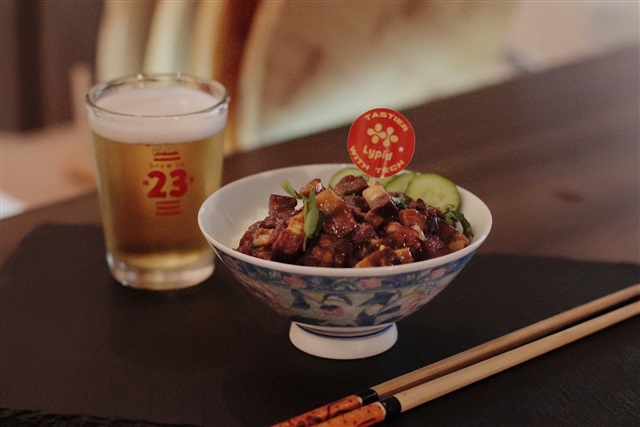Vegetarianism has become a dietary choice for some Taiwanese people, due to religious beliefs or health concerns. While Taiwan's plant-based food industry is more robust compared to other countries, with a wide variety of different products available on the market, "taste" remains to be the biggest challenge for people to try plant-based products. In 2020, two young Taiwanese entrepreneurs, Jen-Yu Huang and Michelle Lee, co-founded Lypid in Silicon Valley in the U.S. to fix this problem through their professional knowledge and skills. They developed PhytoFat, a plant-based fat that can be tuned to precise melting points, allowing plant-based meat to have almost the same mouthfeel and flavor as animal meat. Lypid has already been collaborating with Taiwanese food and beverage companies in introducing plant-based meat products using PhytoFat, which have been highly praised by consumers.
Jen-Yu Huang pointed out that environmental impact, animal welfare, and health issues are the three main drivers that motivated the food industry to focus on plant-based meat in recent years. Compared to the traditional livestock industry, the production of plant-based meat requires less land, water, while generating fewer greenhouse gas emissions making it much more environmentally friendly. Since plant-based meat also omits the process of raising and slaughtering livestock, it offers an alternative choice for consumers who have specific religious beliefs, care about their own well-being, or are concerned about animal welfare.
While plant-based meat provides more options for these consumers, most existing products on the market are still very different from animal meat when it comes to texture and aroma. Although most consumers who opt for a vegetarian diet already have these differences in mind, it would definitely help expand the market if improvements could be made. Jen-Yu Huang points out that the current global meat market has an approximate value of 1 trillion US dollars annually, while the vegetarian market is around 20 billion, accounting for only 2%, according to market research done by research institutions. He believes that if the sensory experiences plant-based meat can be improved, the plant-based meat market could grow to 10%, representing a five-fold growth potential and astonishing commercial prospects.
Jen-Yu Huang further analyzed the technical challenges faced in creating plant-based meat. He explains that the making of plant-based meat involves the extraction of vegetable proteins, followed by adding vegetable oils, seasoning, and other ingredients, before the final processing and combination into a product similar to meat. Commonly used plant proteins include various types of legumes and root vegetables. These vegetable proteins can achieve very similar textures and mouthfeels to animal meat through processing. From the above mentioned process, it's plain to see that the current approach primarily involves combining plant oils and proteins. However, all plant oils are in liquid form and will melt out of the meat matrix when cooking, resulting in a dry texture of plant-based meat. Lypid's PhytoFat can solve this issue.
Lypid's co-founders Jen-Yu Huang and Michelle Lee both graduated from Cornell University. Michelle's academic focus had been food sciences from undergraduate through PhD, and both of them had gained a lot of attention within the industry for their research projects during their undergraduate years. After attaining their PhD degrees, they founded Lypid and created PhytoFat. PhytoFat is made from 97% vegan oils and water, with lower calories and saturated fat ratio than animal fats. Making it much healthier and more sustainable compared to the coconut oil and palm oil that are commonly found in the plant protein market. Furthermore, Lypid uses its proprietary microencapsulation technology to encase PhytoFat. This prevents the vegan oils from degrading in high temperatures. Instead, the fats are slowly released while being cooked to create juicy, succulent plant-based meat dishes.
This technology, unprecedented in the market, has put Lypid under the spotlight within the start-up circle. Jen-Yu Huang and Michelle Lee received industry financing while still in the research phase at university, and raised 4 million US dollars in seed funding in 2022. Plant-based meats made using PhytoFat then won 3 major awards at the 2023 World Food Innovation Awards held in London, U.K., successfully launching Lypid into the market with ample funding and the industrial and academic sectors' endorsement.
Jen-Yu Huang states that Lypid's initial market strategies will focus on North America and Asia. In 2022, he returned to Taiwan to set up a Taiwan office responsible for research and development, as well as mass production. The US headquarters focuses on marketing and international partnerships. Lypid has already launched plant-based meat made with PhytoFat in the Taiwan market. Louisa, a leading coffee chain store in Taiwan, has used it as an ingredient in items such as sandwiches and rice burgers, which have become best sellers in their burger product category. Aside from restaurant chains, other food and beverage businesses have also been utilizing the "plant-based pork belly" developed by Lypid, creating diverse dishes, such as braised pork belly rice and meatballs. The plant-based pork belly combines PhytoFat and special plant protein, creating textures and aromas that have been proven popular in the market.
The reason why Lypid's products have had such smooth sailing since their launch is not simply due to their particular technologies. Jen-Yu Huang believes that the government's start-up policies have also been key. He pointed out that the start-up environment in Taiwan has gradually matured with the government's support. Investors are now significantly more willing to invest in early-stage start-ups, and TTA has become a key startup hub in the international startup community, becoming more and more attractive to overseas companies and investors. This will aid in connecting Taiwan start-up teams with the world. In the future, Lypid will leverage these advantages to actively collaborate with local and international businesses to explore more possibilities for plant-based meat.

Lypid launches Lypid Pork Belly at craft beer bar 23 Public
Photo: Company
